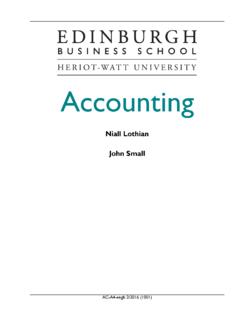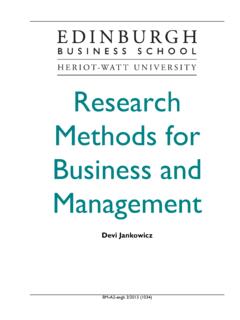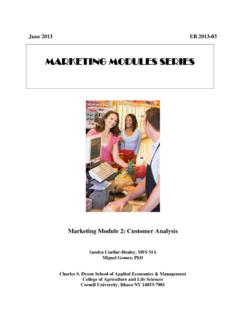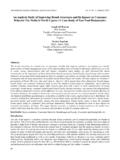Transcription of Consumer Behaviour - Edinburgh Business School
1 CB-A4-engb 1/2013 (1009) Consumer Behaviour Jane Priest Stephen Carter David A. Statt This course text is part of the learning content for this Edinburgh Business School course. In addition to this printed course text, you should also have access to the course website in this subject, which will provide you with more learning content, the Profiler software and past examination questions and answers. The content of this course text is updated from time to time, and all changes are reflected in the version of the text that appears on the accompanying website at Most updates are minor, and examination questions will avoid any new or significantly altered material for two years following publication of the relevant material on the website. You can check the version of the course text via the version release number to be found on the front page of the text, and compare this to the version number of the latest PDF version of the text on the website.
2 If you are studying this course as part of a tutored programme, you should contact your Centre for further information on any changes. Full terms and conditions that apply to students on any of the Edinburgh Business School courses are available on the website , and should have been notified to you either by Edinburgh Business School or by the centre or regional partner through whom you purchased your course. If this is not the case, please contact Edinburgh Business School at the address below: Edinburgh Business School Heriot-Watt University Edinburgh EH14 4AS United Kingdom Tel + 44 (0) 131 451 3090 Fax + 44 (0) 131 451 3002 Email Website The courses are updated on a regular basis to take account of errors, omissions and recent developments. If you d like to suggest a change to this course, please contact us: Consumer Behaviour Jane Priest is a Teaching Fellow at Edinburgh Business School and teaches parts of the on-campus Marketing course, as well as the Consumer Behaviour elective by distance learning.
3 She is a key member of a team exploring how technology can be used to enhance the student learning experience. Before joining Edinburgh Business School , she was a marketing and communications manager for a national health care charity and responsible for the communications strategies of various national government funding programmes. In her undergraduate course at Strathclyde University Business School , she won both the Professor Michael Baker Prize for the single honours student with the highest final weighted average mark, and the Scottish Marketing Awards Prize for the single honours dissertation with the greatest practical application. Professor Stephen Carter is Professor of Marketing at Edinburgh Business School and an acknowl-edged thought leader in global marketing and social and emotional competencies. An ex-project director at the United Nations, he has authored several books on subjects including international marketing strategy and global agricultural marketing.
4 He has co-authored books such as a marketing guide for voluntary and non-profit organisations as well as written programmes for national television and radio. He is co-editor of the American Journal of International Economics and Business Research. His current research interests include: transnational comparisons of social and emotional competences in students, and marketing processes and systems in developing and emerging countries. David A. Statt. The authors are indebted to the late David Statt, formerly Academic Director of the Edinburgh Business School , the author of the original material developed for this course. First Published in Great Britain in 2001. Original edition David A. Statt 2001, 2003 Revised edition David A. Statt, Jane Priest, Stephen Carter 2013 The rights of Jane Priest, Stephen Carter and David A. Statt to be identified as Authors of this Work has been asserted in accordance with the Copyright, Designs and Patents Act 1988.
5 All rights reserved; no part of this publication may be reproduced, stored in a retrieval system, or transmitted in any form or by any means, electronic, mechanical, photocopying, recording, or otherwise without the prior written permission of the Publishers. This book may not be lent, resold, hired out or otherwise disposed of by way of trade in any form of binding or cover other than that in which it is published, without the prior consent of the Publishers. Consumer Behaviour Edinburgh Business School v Contents Preface xii PART 1 THE Consumer IN CONTEXT Module 1 People as Consumers 1/1 Introduction 1/1 Buyers, Customers and Consumers 1/4 Consumer Behaviour 1/4 The Consumer Environment 1/5 The Consumer and the Marketplace 1/6 Markets and Marketing 1/6 Learning Summary 1/10 Review Questions 1/10 Further Reading 1/11 Module 2 Consumer Society 2/1 Introduction.
6 Consumer Society in the Twenty-first Century 2/1 Globalisation and Consumer Behaviour 2/3 Alternative Markets 2/11 Marketing and Social Responsibility 2/15 Learning Summary 2/18 Review Questions 2/18 Further Reading 2/20 Module 3 Market Segmentation 3/1 Introduction: The Origin of Segmented Markets 3/1 Why Use Market Segmentation and Target Marketing? 3/4 Geographic Segmentation 3/6 Demographic Segmentation 3/8 Psychographic Segmentation 3/11 Behavioural Segmentation 3/14 Segmenting Business Markets 3/17 Positioning 3/17 Learning Summary 3/18 Review Questions 3/18 Further Reading 3/20 Contents vi Edinburgh Business School Consumer Behaviour Module 4 New Products and Innovations 4/1 Introduction 4/1 Developing New Products 4/2 The Product Life Cycle 4/6 The Effects of Personal Influence 4/8 The Diffusion of New Products and Innovations 4/10 The Adoption of New Products and Innovations 4/12 Cultural and Social Implications for Innovations 4/15 Learning Summary 4/17 Review
7 Questions 4/17 Further Reading 4/19 PART 2 THE INDIVIDUAL PERSPECTIVE Module 5 Perception 5/1 Introduction: Can We Trust Our Senses? 5/2 Using Our Senses 5/2 Common Properties of the Senses 5/6 Perception: Processing Sensory Information 5/8 Organising Perceptual Cues 5/13 Subliminal Perception 5/18 Self-images, Symbolism and Consumer Behaviour 5/19 Perceiving Risk 5/20 Learning Summary 5/22 Review Questions 5/22 Further Reading 5/25 Module 6 Personality and the Self 6/1 Introduction: How Does Our Personality Affect What We Buy? 6/1 What Is Meant by Personality? 6/2 Formal Theories of Personality 6/3 Freudian Psychoanalysis 6/4 Neo-Freudian Psychoanalysis 6/8 Trait Theory 6/9 Self Theory 6/11 Learning Summary 6/19 Review Questions 6/20 Further Reading 6/21 Contents Consumer Behaviour Edinburgh Business School vii Module 7 Learning, Memory and Thinking 7/1 Introduction: How Do We Learn?
8 7/1 What Is Learning? 7/2 The Behaviourist Approach 7/2 The Cognitive Approach 7/9 Modelling 7/17 Learning Summary 7/19 Review Questions 7/19 Further Reading 7/20 Module 8 Motivation 8/1 Why Do People Buy What They Buy? 8/1 What Is Meant by Motivation? 8/2 Defining Motivation 8/3 The Fulfilment of Needs 8/5 The Motivational Mix 8/9 Unconscious Motivation 8/15 Learning Summary 8/18 Review Questions 8/18 Further Reading 8/20 PART 3 THE SOCIAL PERSPECTIVE Module 9 Family Influences 9/1 Introduction: How Does Our Upbringing Affect Us as Consumers? 9/2 What Is a Family? 9/2 Socialisation 9/6 Family Buying Decisions 9/10 Life-cycle Effects 9/13 Non-family Households 9/16 Age and Consumer Identity 9/17 Learning Summary 9/19 Review Questions 9/20 Further Reading 9/22 Contents viii Edinburgh Business School Consumer BehaviourModule 10 Social and Developmental Influences 10/1 Introduction: How Does Our Psychological Development Affect Our Consumer Behaviour ?
9 10/1 Maturation 10/2 Stages of Development 10/3 Development of Economic Concepts 10/8 External Influences on Consumer Socialisation 10/9 Learning Summary 10/14 Review Questions 10/14 Further Reading 10/16 Module 11 The Influence of Small Groups 11/1 What Are the Effects of Group Pressure on the Individual Consumer ? 11/1 Types of Group 11/2 Properties of Group Life 11/7 Reference Groups and Consumer Behaviour 11/16 Learning Summary 11/18 Review Questions 11/19 Further Reading 11/20 Module 12 The Influence of Social Class 12/1 How Does Our Social Class Affect What We Buy? 12/1 Social Stratification 12/2 Social Status and Symbols 12/3 Life Chances and Lifestyles 12/5 Measuring Social Class 12/7 Social Class Categories 12/9 Changing Social Class 12/13 Marketing and Consumer Behaviour 12/14 Learning Summary 12/15 Review Questions 12/16 Further Reading 12/17 Module 13 Cultural Influences 13/1 How Does Our Culture Affect What We Buy?
10 13/1 Similarities across Cultures 13/3 Differences between Cultures 13/4 Cultural Values 13/5 Contents Consumer Behaviour Edinburgh Business School ix Subcultures 13/15 Changes in Culture 13/18 Learning Summary 13/19 Review Questions 13/20 Further Reading 13/21 Module 14 Attitudes 14/1 Where Do Our Attitudes Come From and How Do They Change? 14/1 What Are Attitudes? 14/2 Characteristics and Components of Attitudes 14/3 Forming Attitudes 14/6 Theories of Attitudes 14/7 Changing Attitudes 14/12 Attitudes and Behaviour 14/16 Learning Summary 14/18 Review Questions 14/19 Further Reading 14/21 PART 4 Consumer DECISION MAKING Module 15 Communication and Persuasion 15/1 How does Advertising Affect Our Behaviour ? 15/1 The Importance of Advertising 15/2 The Process of Communication 15/2 Feedback and Evaluation 15/12 Cultural Factors in Advertising 15/15 Learning Summary 15/18 Review Questions 15/18 Further Reading 15/19 Module 16 Approaching a Decision 16/1 How People Make Decisions 16/1 Heuristics 16/3 The Consumer Decision Process 16/5 Marketing Implications 16/17 Learning Summary 16/19 Review Questions 16/20 Further Reading 16/21 Contents x Edinburgh Business School Consumer BehaviourModule 17 The Decision and Its Consequences 17/1 Introduction 17/1 Stage IV: Purchasing Processes 17/1 Stage V.
















